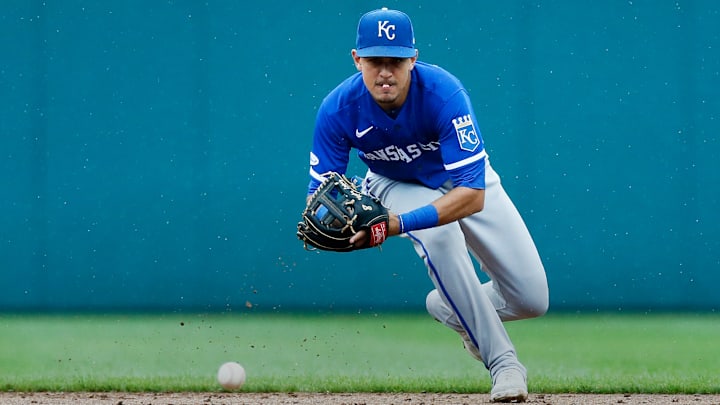Little remains for the KC Royals to look forward to this season. The one-Royal 2023 All-Star Game is over, their hopes of a decent season disintegrated long ago, and an embarrassing 100-loss season isn't something they'll escape.
That leaves two main things—the potential big league debuts of a few prospects and the trade deadline—to hold fan interest.
Of most immediate concern is the latter attraction.
August 1 is this year's deadline for clubs to complete major league-level trades. Their terrible season means the Royals will be sellers, with reliever Scott Barlow, who the club should move, the most likely to be dealt. Others will likely be sent packing, too. And although many believe he ought to be on the block, the Royals should keep Nicky Lopez. Here's why.
Nicky Lopez is definitely the KC Royals' best long-term utility infielder
This may be the biggest reason Kansas City should hold on to Lopez. While many decry his bat amid increasingly convincing evidence that his surprisingly excellent 2021 season at the plate was merely an outlier, his versatility and strong glovework render him pretty valuable.
Lopez plays every infield position but first base, and it's a good bet he'd play that corner well if manager Matt Quatraro needed him there. His big league career fielding percentages—1.000 in 56 games at third base, .990 in 231 games at second, and .987 in 242 appearances at second—are all above league average, and his career OAA numbers aren't shabby, either.
And Lopez fared quite well when Quatraro tested him in left field during the final game before the All-Star Break, but it remains to be seen how often he'll venture back into the outfield.
So, he gives Quatraro starting and reserve options with which the Royals shouldn't want to part. Yes, his bat is both inconsistent and too often weak and Matt Duffy, the club's primary alternative, hits better—entering today's twinbill, he's slashing .283/.336/.358 in 45 games compared to Lopez's .221/.338/.301 in 57. But at 32, Duffy is certainly not as much in Kansas City's long-term plans as Lopez should be at 28.
The KC Royals won't reap a stellar return by trading away Nicky Lopez
Some contenders probably have Lopez on their trade deadline radar—his defense and ability to so competently handle different positions make him difficult to overlook and easy to consider.
But he's not the same type of utility man as, say, Ben Zobrist, who brought versatility, a good glove, and a strong bat to the Royals when, at the 2015 trade deadline, they sent pitching prospects Sean Manaea and Aaron Brooks to Oakland to get him for their stretch run and march to the World Series. Lopez has the same kind of reliable versatility, and plays better defense, but can't measure up offensively to someone like the now-retired Zobrist. If he could, Kansas City could expect a decent return for Lopez.
But aside from the .300 he hit two seasons ago, Lopez's bat remains the problem. The .240 he hit as a rookie in 2019 remains the second-best of his five-year big league career, and he hit .201 in 2020 and .227 in 2022, averages much more consistent with the .221 he has this year.
And that's why Lopez, at least alone, won't yield a great return if the Royals trade him. Chances are good, too, that even if packaged in a deal with a far more attractive target like Barlow, he still won't command much.
(Lopez is also under team control for this and two more seasons, which means the club doesn't need to rush a trade just to get some kind of value before he hits free agency).
So it is that, with the value he represents to a club striving for some degree of relevance and the slim chance that dealing him away will bear much fruit, Kansas City, a club that doesn't need to trade Lopez, shouldn't.
